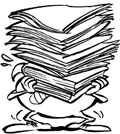


 · 1-XI-2020 · 120$ · 89£
· 1-XI-2020 · 120$ · 89£
Libro de 280 páginas encuadernado en cartoné. Antología de ensayos sobre la historieta española coordinada por Anne Magnussen.
CONTENIDOS:
Introduction: Spanish Comics. Historical and Cultural Perspectives
Anne Magnussen
Chapter 1. Dissenting Voices? Controlling Children’s Comics under Franco
Rhiannon McGlade
Chapter 2. Satirical Panels against Censorship. A Battle That Raged during the Spanish Transistion
Gerardo Vilches
Chapter 3. Tintin in the Movida Madrileña. Gender and Sexuality in the Punk Comic Book Zine Scene
Louie Dean Valencia-García
Chapter 4. From Pioneer of Comics to Cultural Myth. Castelao in Galician Graphic Biography
David Miranda-Barreiro
Chapter 5. The Representation of Traumatic Memory in Spanish Comics. Remembering the Civil War and Francoism
Juan Carlos Pérez García
Chapter 6. ‘For He Bestirred Himself to Protect the Land from the Moors’. Depicting the Medieval Reconquista in Modern Spanish Graphic Novels
Iain A. MacInnes
Chapter 7. An interview with Paco Roca
Esther Claudio
Chapter 8. ‘They Tried To Bury Us; They Didn’t Know We Were Seeds’: Intergenerational Memory and La Casa
Sarah D. Harris
Chapter 9. Paco Roca’s Graphic Novel La Casa (2015) as Architectural Elegy
Benjamin Fraser
Chapter 10. Therapeutic Journeys in Contemporary Graphic Novels
Agatha Mohring
Chapter 11. Social Criticism through Humour in the Digital Age. Multimodal Extension in the Works of Aleix Saló
Javier Muñoz-Basols and Marina Massaguer Comes
Chapter 12. Historicising the Emergence of Comics Art Scholarship in Spain, 1965–1975
Antonio Lázaro-Reboll
Texto promocional del editor:
Spanish comics represent an exciting and diverse field, yet one that is often overlooked outside of Spain. Spanish Comics offers an overview on contemporary scholarship on Spanish comics, focusing on a wide range of comics dating from the Francoist dictatorship, 1939-1975; the Political Transition, 1970-1985; and Democratic Spain since the early 1980s including the emergence of the graphic novel in 2000. Touching on themes of memory, gender, regional identities, and history, the chapters in this collection demonstrate the historical and cultural significance of Spanish comics.